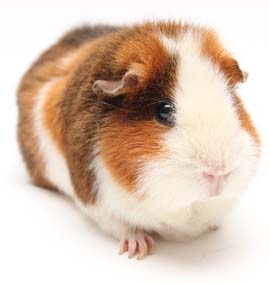Guinea pigs
Guinea pigs
Caring for your guinea pig

There is no one way to care for all guinea pigs because every guinea pig and every situation is different, but certain essential needs must be met. Guinea pigs are now housed indoors as house pets as well as outside. It is up to you how you look after your guinea pig, but you must take reasonable steps to ensure that you meet all their needs.
Environment
Provide your guinea pigs with secure accommodation that is large enough for them all to exercise in and high enough for them to stand up fully on their back legs.
You should provide both a large exercise area and a secure shelter where your guinea pigs can rest, feel safe and are protected from predators and extremes of weather and temperature. Ensure all areas of your guinea pigs' environment are well ventilated, dry and draught-free. Clean the guinea pigs' accommodation regularly, to ensure they have clean, dry bedding.
Provide plenty of horizontal space with pipes and shelters to encourage your guinea pigs to exercise. Allow your guinea pigs to exercise regularly; ideally they should have free access to their exercise area.
If housed outdoors, the accommodation should be sheltered from direct sun and the prevailing wind direction. Ideally, when temperatures drop to below 15°C guinea pigs should be housed indoors. If housed indoors, the accommodation should be away from direct sources of heat such as radiators and sunny windows and protected from draughts. A room temperature of 17-20°C is ideal.
Provide untreated wooden toys to chew, such as fruit tree or willow sticks. Avoid toys made of plastic, as they may harm your guinea pigs if chewed and swallowed.
Health and welfare
Get your male guinea pigs neutered.
Check your guinea pigs for signs of illness or injury every day. Consult a vet immediately if you suspect that your guinea pig is in pain, ill or injured.
Front teeth and nails should be checked at least once a week as these can grow quickly. Only a vet should correct overgrown or misaligned teeth. Take your guinea pigs for a routine health check at your vets at least once each year. Give your guinea pigs treatment for external and internal parasites (e.g. mites and worms) as necessary, as advised by your vet. Only use medicines that have been specifically recommended for your individual guinea pig by a vet. Some medicines used for other animals can be very dangerous to guinea pigs.
Ensure your guinea pigs' coats are kept in good condition by grooming them regularly. If you are unsure how to groom your guinea pigs properly seek advice from a pet care specialist. This is especially important in long haired breeds, which will need grooming daily. If your guinea pig changes their grooming habits, you should seek advice from a vet as your guinea pig may be ill.
Diet
Provide fresh clean drinking water at all times. Check the water supply twice a day. Make sure the water doesn't freeze in winter.
Good quality hay should make up the majority of your guinea pigs' diet and should be available at all times. Fresh grass and vegetables should be given as frequently as possible and ideally daily.
A fresh portion of grass-based guinea-pig pellets should also be available daily, as per the manufacturer's instructions. This will provide essential Vitamin C. Vitamin C is destroyed over time and quickly with exposure to the air. So a fresh portion of pellets must be given each day, do not just top up the bowl, and always ensure the pellets are used by the best before date.
Fresh grass and leafy greens such as kale and broccoli are excellent sources of Vitamin C, and some leafy greens should be provided daily. However, do not give citrus fruits to your guinea pigs.
Find out which plants are safe to feed your guinea pigs. Offer safe, washed leafy greens or weeds every day.
Only give root vegetables like carrots, or fruit such as apples, in small amounts, such as an apple quarter, as a treat. Do not feed any other treats as these may harm your guinea pigs.
Adjust how much you feed your guinea pig to make sure they do not become underweight or overweight. If your guinea pig's eating or drinking habits change, talk to your vet straight away.


